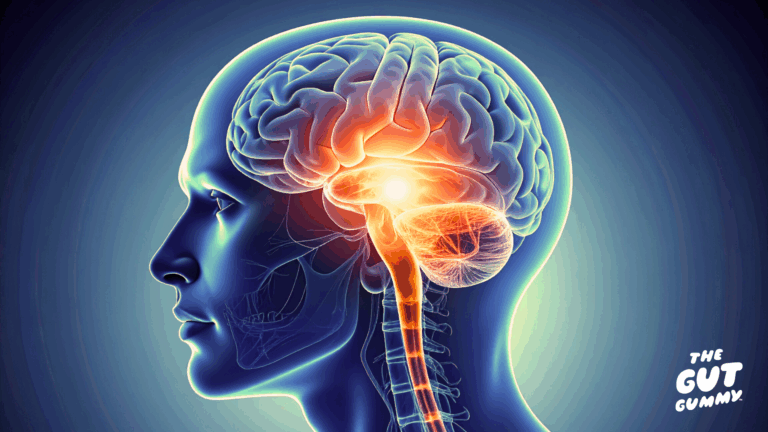Are you aware of the gut-brain connection? Believe it or not, your belly and your brain are besties—and they’re constantly chatting. When you’re feeling foggy, stressed, or just “off” for no clear reason, the problem might not be your calendar or your coffee—it could be your gut health.
Yep, your digestive system does way more than break down food. It actually plays a huge role linked to your brain in how you feel emotionally and mentally. The gut-brain connection powers this link, impacting everything from your mood to your focus.
Let’s break it down—no complicated science talk, just the good stuff you should know.
So, What Is the Gut-Brain Connection?
Think of your brain and your gut like two phones on a group chat—they’re constantly sending messages back and forth through something called the gut-brain axis. This includes:
- The vagus nerve (think of it as a hotline between your brain and gut)
- Neurotransmitters (happy chemicals like serotonin and dopamine)
- The gut microbiome (a mini jungle of bacteria living in your digestive tract)
- Your immune system (which your gut influences big time)
So, when your gut isn’t happy, it sends out distress signals—and your brain listens.
How Does a Grumpy Gut Mess With Your Mood and Mind?
1. Your Gut Makes Happy Chemicals
Did you know your gut produces around 90% of your serotonin—the feel-good chemical? This is because your gut also helps produce:
- Dopamine: a neurotransmitter that keeps you motivated and joyful
- GABA: a naturally occurring amino acid in the brain that helps calm your nerves and manage anxiety
When your gut is out of whack due to bad food, stress, or inflammation, it can throw these chemical levels off, leaving you anxious, sad, or cranky. It’s no wonder that tummy trouble can mess with your mood!
2. Your Gut Bugs Affect Your Brain
Those trillions of good bacteria living in your belly? These bacteria aren’t just digesting food—they’re helping you think more clearly. When balanced, they help with:
- Focus and memory
- Emotional balance
- Managing stress
- Feeling mentally sharp
But when too many bad bugs take over your gut (thanks to sugar and stress), they can make your brain feel fuzzy, forgetful, and moody.
3. Gut Inflammation = Brain Fog
If your gut becomes inflamed or “leaky” (yep, it’s a thing), it allows toxins to sneak into your bloodstream. That creates inflammation, which can result in:
- Brain fog
- Low energy
- Trouble concentrating
- Mood dips
So basically, an angry gut can turn your brain into a sluggish, cloudy mess.
What Affects Your Gut (and Your Mood)?
Here are the big players:
- Food Choices: Load up on fiber, prebiotics, and fermented foods (like kimchi or yogurt). Avoid too much sugar, processed stuff, and alcohol.
- Stress: Chronic stress hurts gut health. Try deep breathing, journaling, or quick walks to stay balanced.
- Sleep: Poor sleep messes with your gut—and vice versa. Keep a regular bedtime.
- Probiotics & Prebiotics: Probiotics add good bacteria (hello, yogurt!). Prebiotics (like garlic and bananas) feed them.
- Movement: Exercise keeps your digestion on point and boosts mood chemicals naturally.
Helpful Supplements To Support Gut-Brain Harmony

If your gut needs extra love, try adding gut-friendly supplements like these:
A delicious drink mix (in Razzle Berry or Strawberry Lemonade!) with just 25 calories and a whopping 33 nutrients to boost your energy, mood, and focus—without the crash.* It supports mental clarity, motivation, and a more positive vibe all day long.*
GG-360™
A powerful tribiotic gummy (yep—prebiotics, probiotics, AND postbiotics in one!), clinically backed ingredients to support digestion, metabolism, immune health, skin glow, mood balance, and even recovery.* It’s wellness in gummy form.
Final Thoughts
Your gut isn’t just where food goes—it’s where your mood and mental energy are built. When you treat your gut right, your brain gets happier, sharper, and more focused too.
So, if you’re feeling low or fuzzy, don’t just power through—check in with your gut. With the right food, habits, and support (like ZipBOOM and GG-360), your mind and mood can bounce back in a big way!
SOURCES:
https://www.health.harvard.edu/diseases-and-conditions/the-gut-brain-connection
https://pmc.ncbi.nlm.nih.gov/articles/PMC5641835
https://www.hopkinsmedicine.org/health/wellness-and-prevention/the-brain-gut-connection






